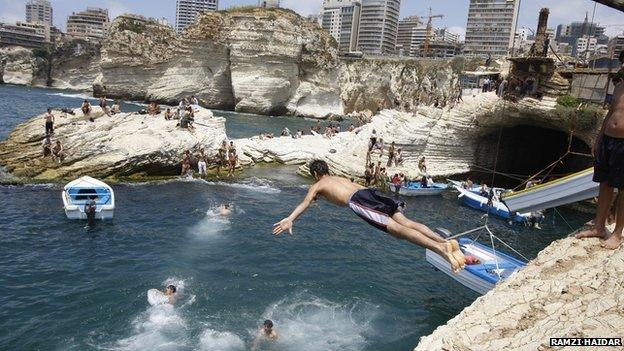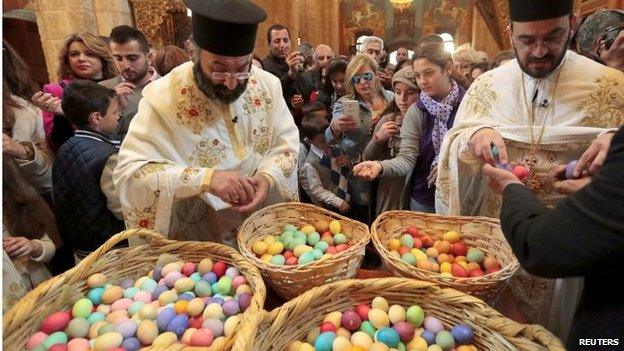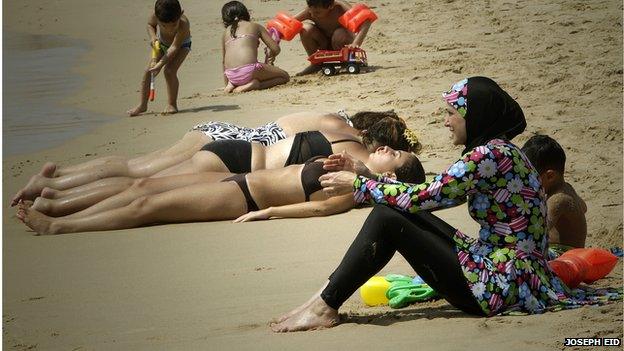Can a country have too many public holidays?
- Published

As the May Day holiday is marked around the world, for Lebanon it is just one of many in a country which enjoys more public holidays than anywhere else in the region.
Some 17 official days off in this year's calendar is one of the upsides to living here, and its explanation lies in Lebanon's complex political system and patchwork of religions.
Like almost every other institutional arrangement, the public holidays are designed to maintain the fragile balance between the different sects in the country.
Most public holidays are religious ones. Lebanon has 18 official sects and a political system which is based on a sectarian division of power.
Therefore, religious sensitivities help explain the relatively high number of public holidays.
While other countries which celebrate Easter, for example, get one Easter holiday, Lebanon gets two. The religious calendars of both Orthodox and Catholic Christians must be honoured.
The same goes for the Eid al-Fitr holiday at the end of Ramadan. Since Shia and Sunni Muslims often dispute the timing of start of Ramadan and the date of Eid al-Fitr, Lebanon gets a double Ramadan holiday, or an extended one.

Lebanese public holidays, 2016
1 Jan - New Year's Day
6 Jan - Armenian Orthodox Christmas Day
9 Feb - St Maroun Day
14 Feb - Rafik Hariri Memorial Day
25 March - Feast of the Annunciation
25 March - Good Friday (Western)
27 March - Easter Sunday (Western)
29 April - Good Friday (Eastern)
1 May - Easter Sunday (Eastern)
1 May - Labour Day
25 - Liberation and Resistance Day
7 July - Eid al-Fitr
15 August - Assumption of Mary
11 September - Eid al-Adha
2 October - Islamic New Year
11 October - Ashura
22 November - Independence Day
12 December - Birthday of Prophet Muhammad
25 December - Christmas Day

There is also a national holiday on 6 January. The date is Christmas Day for Armenians, who are more of an ethnic minority than a separate religious group.
But Lebanon's political system only functions in terms of sect. Therefore, the Armenian Lebanese are considered as a sect of their own.
Rare phenomenon
The list of public holidays is long. It includes Christmas, Eid al-Adha, Ashura, the Assumption of Virgin Mary and the Feast of the Annunciation.
This last one holds a special status. It marks the moment when the Angel Gabriel told Mary that she would become the mother of Jesus.
Islam and Christianity fundamentally disagree on the nature of Jesus, but they share the belief in that moment. Therefore, the Feast of the Annunciation is officially a Christian and Muslim holiday.

Two Easters = lots of eggs
Of course, all citizens are granted all holidays regardless of their religious denomination.
And to avoid any sensitivity, the number of Christian public holidays must correspond as closely as possible to the number of Muslim public holidays.
A mismatch could risk signalling that one group has an upper hand over the other and cause upset.
The holidays, though, are not fixed and sometimes there are anomalies.
This year for example, the birthday of the Prophet Muhammad will be celebrated twice: in January and again in December. It happens only once every 33 years.
The reason is to do with the length of the Hijri (Islamic) calendar, which is 11 days shorter than the Gregorian (Christian) calendar.
For Muslims the December birthday of the Prophet falls on the 24th, also Christmas Eve. Such a convergence gives a strong boost to those who celebrate pluralism and coexistence in Lebanon.
'Scrap Good Friday'
In a multi-confessional state, religious public holidays have become an almost sacred right; what is at stake here is the pride of the sect and those who belong to it.
A few years ago, an attempt was made to reduce the number of public holidays.
One suggestion was to scrap Good Friday from the holiday agenda. The proposal was vehemently rejected by indignant Christians.

Public holidays are only a minor inconvenience
The Christian MPs who did not object were severely criticised by their own supporters.
Good Friday remains a public holiday, celebrated twice, except for the years when Orthodox Christians and Catholics agree on the same Lent calendar.
For all their benefits, however, having so many public holidays also has its downsides.
Waiting for a money transfer, finalising an official procedure, or having to depend on local services for an unfinished piece of work might be even more frustrating when holidays become an obstacle.
But the purpose of preserving the equal rights of each sect and projecting a sense of national cohesion seems to take precedence and inconveniences are hardly noted.
Besides, Lebanon has deeper troubles. Its institutions have been almost paralysed for a year. The country is without a president and the government is barely functioning.
A few extra days off are not likely to have a significant impact. If anything, they lift the mood of the nation.